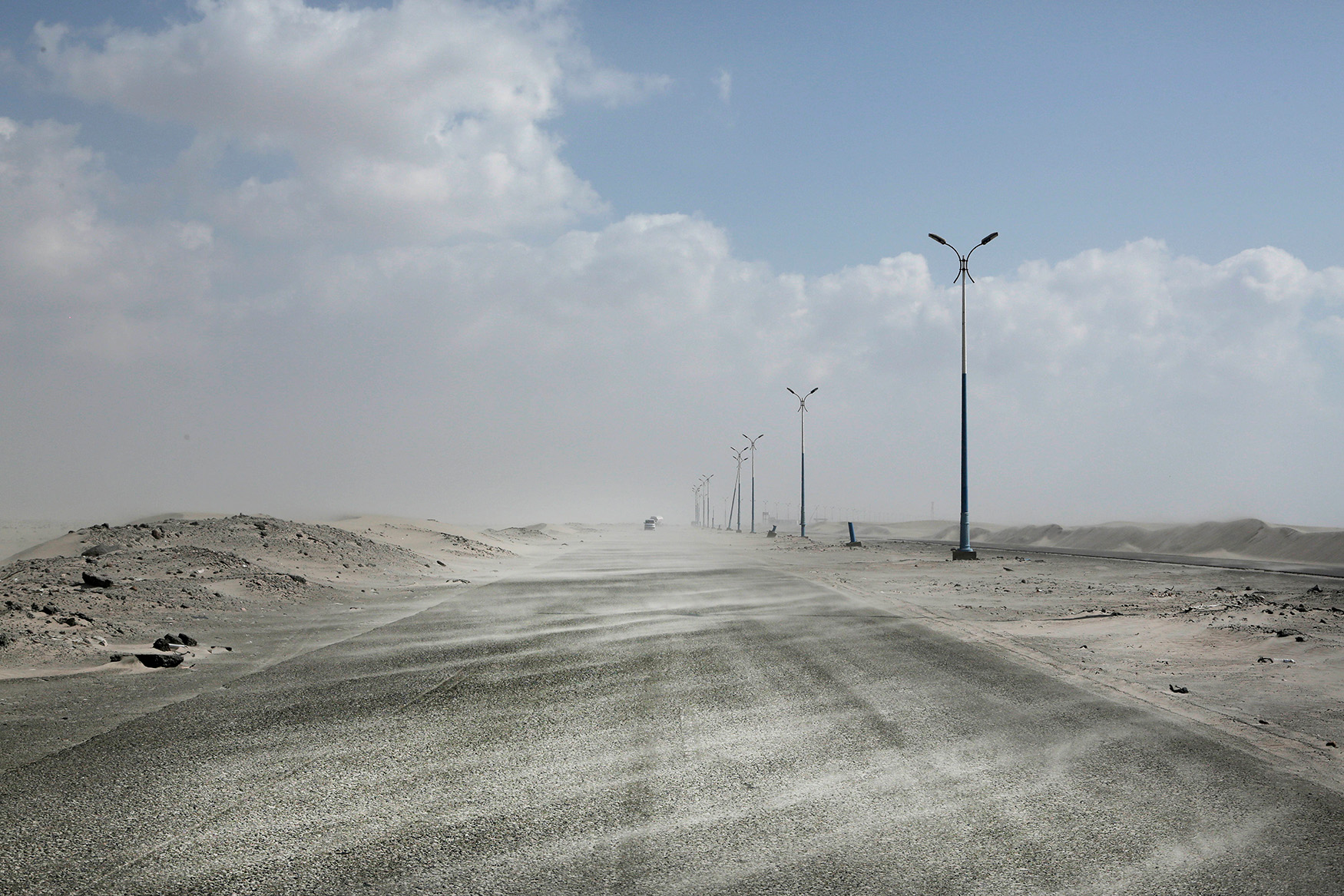Fishermen risk death in Yemen’s violent waters

Every time Ammar Ahmed heads out to sea, he thinks about the helicopter.
Earlier this month, after three days without a catch, he and eight other Yemeni fishermen decided to take their small boat into deeper waters, closer to the invisible boundary off the Red Sea coast enforced by the Saudi-led coalition at war with Yemen’s Houthi rebels.
In this Sept. 29, 2018 photo, Yemeni fishermen load their nets on to a boat before a fishing trip at the main fishing port, in Hodeida, Yemen. (AP Photo/Hani Mohammed)
That’s when the Apache helicopter swooped in over the waves, its heavy guns causing a frenzy in the churning waters.
“The Apache attacked, firing everywhere,” the 70-year-old father of three told The Associated Press in his small port town of Mahwa. “Everyone jumped in the water.”
The men treaded water for more than 20 minutes as the Apache continued to hover overhead. When it flew off, they returned to their boat and sailed back to port empty-handed. Ahmed was so traumatized by the experience he couldn’t go near the water for two weeks.
But then a new fear took hold — hunger.
In this Sept. 29, 2018, photo, a boy holds the catch of the day on a boat at the main fishing port, in Hodeida, Yemen. (AP Photo/Hani Mohammed)
The three-and-a-half-year war in Yemen has caused the world’s worst humanitarian crisis, with two thirds of the population — some 18 million people — relying on humanitarian aid. International aid agencies say 8 million Yemenis don’t know where their next meal is coming from.
So an estimated 300,000 fishermen still ply the waters of Yemen’s Red Sea coast, where heavy fighting has been underway for months as the coalition tries to pry the port city of Hodeida — a crucial lifeline for aid — from the Iran-aligned rebels.
The fishermen try to avoid the coalition warships, which are on the lookout for weapons smugglers and rebels armed with rockets and explosives. The Houthis have carried out several attacks on ships off Yemen’s coast.
In this Sept. 29, 2018, photo, fishermen work on their nets before a fishing trip at the main fishing port, in Hodeida, Yemen. (AP Photo/Hani Mohammed)
The fishermen share advice on Facebook, warning each other to avoid international waters, to stay 5 kilometers (3 miles) from any ships, and to wave white flags or fish in the air if one approaches them.
It doesn’t always work.
Just days before Ahmed’s encounter with the Apache, a frigate opened fire on a fishing boat, killing 18 fishermen from a small village near the port of Khokha and leaving just one survivor. In October 2015, coalition ships and Apaches killed 48 fishermen who were heading to an island some 30 miles (48 kilometers) offshore to rest.
The governing body in charge of Red Sea fishing in Yemen, which is currently controlled by the Houthis, says more than 220 fishermen have been killed in more than 70 attacks since the fighting broke out in March 2015.
In this Sept. 29, 2018, photo, fishermen head out to sea for a fishing trip as the sun sets near the fishing port, in Hodeida, Yemen. (AP Photo/Hani Mohammed)
The fishermen used to stay out at sea for 15 days at a time, but now the trips are much shorter, and the catches smaller. The price of fish has gone up as a result, making it too expensive for many Yemenis and further squeezing the fishermen.
“Hunger is harder than fear,” Ahmed said. “It’s scary for me to go out because I don’t know if I will return or not, but how do I live seeing my family not able to feed itself?”
In this Sept. 29, 2018, photo, fishermen rest on their boats before working at the main fishing port, in Hodeida, Yemen. (AP Photo/Hani Mohammed)
In this Sept. 29, 2018, photo, 71-year-old Yemeni fisherman Ammar Ahmed prepares his nets before a fishing trip at the main fishing port, in Hodeida, Yemen. (AP Photo/Hani Mohammed)
In this Sept. 29, 2018, photo, a fisherman holds fish at the main fishing port in Hodeida, Yemen. (AP Photo/Hani Mohammed)
In this Sept. 29, 2018, photo, Yemeni fishermen work on their boat at the main fishing port, in Hodeida, Yemen. (AP Photo/Hani Mohammed)
In this Sept. 29, 2018, photo, Yemeni fishermen fix their nets before a fishing trip at the main fishing port, in Hodeida, Yemen. (AP Photo/Hani Mohammed)
In this Sept. 29, 2018, photo, 71 year-old Yemeni fisherman Ammar Ahmed, center, prepares his net before a fishing trip at the main fishing port, in Hodeida, Yemen. (AP Photo/Hani Mohammed)
In this Sept. 29, 2018, photo, fishermen rest on their boats before fishing at the main fishing port, in Hodeida, Yemen. (AP Photo/Hani Mohammed)
In this Sept. 29, 2018, photo, fishermen take a break and chew Qat, an amphetamine-like stimulant, on a boat at the main fishing port, in Hodeida, Yemen. (AP Photo/Hani Mohammed)
In this Sept. 29, 2018, photo, fishermen fix their nets before a fishing trip at the main fishing port, in Hodeida, Yemen. (AP Photo/Hani Mohammed)
This Sept. 29, 2018, photo, shows fishing boats docked at the main fishing port, in Hodeida, Yemen. (AP Photo/Hani Mohammed)
Text from the AP news story, AP PHOTOS: Fishermen risk death in Yemen’s violent waters, by Hani Mohammed.
Photos by Hani Mohammed





